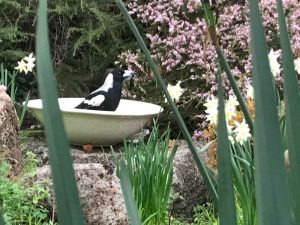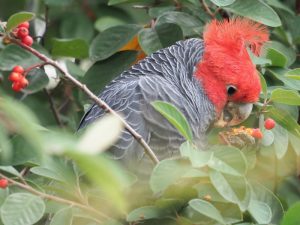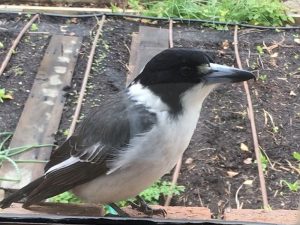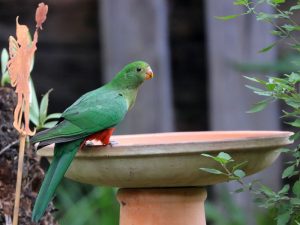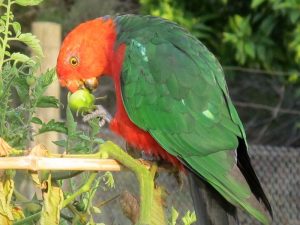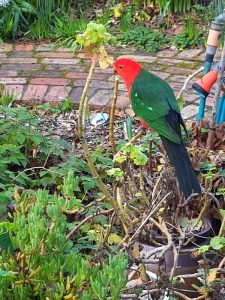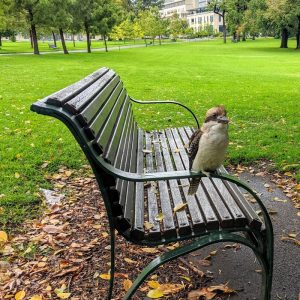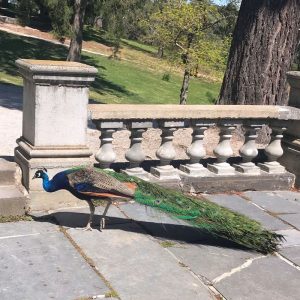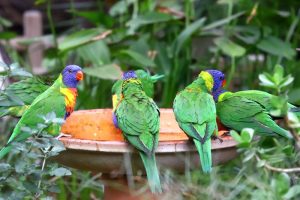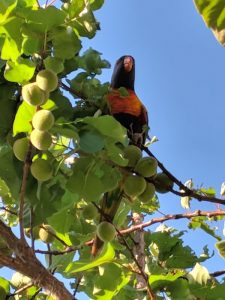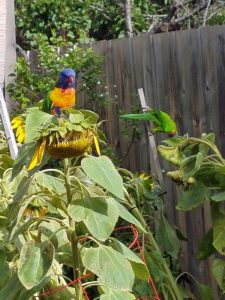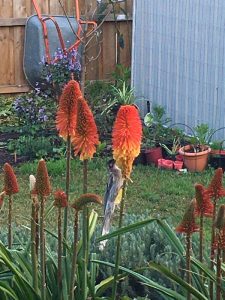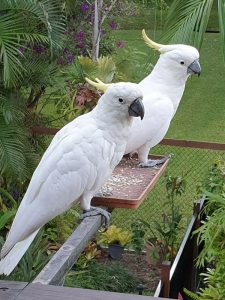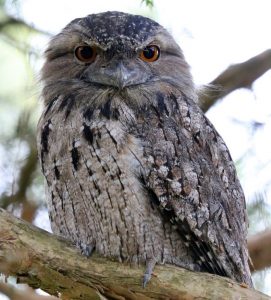Thanks to all the people who have contributed to this week’s newsletter: Angelo Eliades, Carol Woolcock, Cathy Romeo, Chantelle Ladouceur, Choon Yin Yeok, Chris Kent, Drew Barr, Fay Loveland, Janet King, Jo Buckle, Lyn Richards, Megan Goodman, Pam Jenkins, Rita Varrasso, Saimon Boyle, Shellie Drysdale, Shiva Vasi, Stuart Rodda, Vasundhara Kandpal, Virginia Solomon and Yennie Starkey.
What farmers’ markets will be happening this weekend?
On Saturday: Abbotsford Convent (relocated to Alphington) and Coburg. Not Wonga Park.
On Sunday: Alphington and Eltham.
Vasundhara’s recipes of the month – curry
The theme for Vasundhara Kandpal’s three recipes this month is curry. The three recipes are:
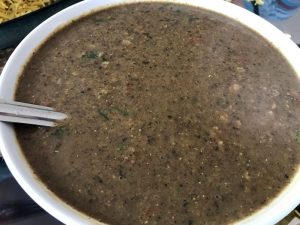 |
 |
 |
| Black lentil curry | Pumpkin curry | Veggie butter masala |
Like all of Vasundhara’s recipes, the recipes are plant-based.
As I’ve got space, I’m going to put my favourite of the three recipes (pumpkin curry) in full below but you will have to go to the website to read the other two (black lentil curry and veggie butter masala).
Pumpkin curry
Ingredients
2 teaspoons fennel seeds
1 teaspoon onion seeds
1 teaspoon fenugreek seeds
2 cups pumpkin, diced
1 teaspoon turmeric
1 cup tomatoes, chopped (optional)
salt to taste
Method
Heat oil. Keep checking the oil to see if it is hot enough to do the tempering.
Add all the seeds. They should make a noise / splatter. Make sure it does not burn. Add the diced pumpkin or squash. Add the salt and turmeric. Sprinkle some water.
Cover with a lid and let it sit to cook on medium or low flame until the pumpkin is soft. Add the tomatoes and cook until the tomatoes soften and mash well.
Serve. You can add lemon on top if you want.
Note: You can cook in a pan or a pressure cooker. If using a pan, cover it with a lid.
Read more of Vasundhara’s recipes on our website.
Vasundhara Kandpal is a professional cook who operates a meals delivery service called Green Karma in Briar Hill, Eltham, Eltham North and Montmorency. Read her menu and order.
Pam on the problems with her citrus trees
 With the Stage 3 restrictions, some of our readership are upping their production of material for this newsletter. Pam Jenkins is one of them. This week, Pam has produced a video about the problems with her citrus trees. Here is what she says about her lemon tree: “we discovered that the tree was badly affected with collar rot. This is a known problem in citrus and is often caused by people allowing their moist mulch to remain right up against the trunk. We thought that the tree was so badly affected that it would die off in a fairly short time frame. With the intention of replacing it, we didn’t treat the rot by cutting back the diseased bark and the applying fungicide. A couple of years later, we created some terraces in the area and discovered that the tree had been planted too deeply, so we pulled the soil away from the trunk to root level and now maintain it there. The disease continues slowly and, at some point, the tree will no doubt succumb.”
With the Stage 3 restrictions, some of our readership are upping their production of material for this newsletter. Pam Jenkins is one of them. This week, Pam has produced a video about the problems with her citrus trees. Here is what she says about her lemon tree: “we discovered that the tree was badly affected with collar rot. This is a known problem in citrus and is often caused by people allowing their moist mulch to remain right up against the trunk. We thought that the tree was so badly affected that it would die off in a fairly short time frame. With the intention of replacing it, we didn’t treat the rot by cutting back the diseased bark and the applying fungicide. A couple of years later, we created some terraces in the area and discovered that the tree had been planted too deeply, so we pulled the soil away from the trunk to root level and now maintain it there. The disease continues slowly and, at some point, the tree will no doubt succumb.”
Yes, you did know!
Two weeks ago, Beata Clark asked about how to make sustainable potting mix, particularly the mineral content.
Saimon Boyle’s response: “50% sand to 50% compost should provide both the drainage and the nutrients needed“.
No, you didn’t know
No one has yet answered Paul Hemsworth’s question from last week about why earthworms end up drowned in his bird bath. Email me with your answer.
No one has answered Georgina Aquilina’s (aquaponics) question from the previous week.
Want to buy a face mask and support a worthy cause?
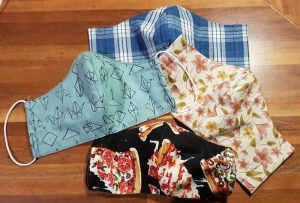 Virginia Solomon will be selling handmade face masks at next Sunday’s (26th July) Eltham Farmers’ Market. The face masks are made by volunteers with a removable nose wire and a non-woven filter layer. They come in 3 sizes to fit men, women/teens, and children 4-9. $17 each or 2 for $30. Cash only. All proceeds to Permaculture Australia helping minimise the impact of single-use masks in the waste stream. The fabrics shown in the photo are indicative only.
Virginia Solomon will be selling handmade face masks at next Sunday’s (26th July) Eltham Farmers’ Market. The face masks are made by volunteers with a removable nose wire and a non-woven filter layer. They come in 3 sizes to fit men, women/teens, and children 4-9. $17 each or 2 for $30. Cash only. All proceeds to Permaculture Australia helping minimise the impact of single-use masks in the waste stream. The fabrics shown in the photo are indicative only.
Drew Barr on decomposers
Watch this video where newsletter reader Drew Barr explains the role of decomposers in breaking down and returning nutrients to the soil.
[Editor: Question – when did Mozart stop composing? Answer – when he started decomposing.]
What to do with your spent mushroom kits
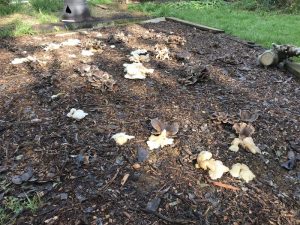 Stuart Rodda spread them in his garden and covered them with mulch. After rain/seepage kept the area wet, look what happened!
Stuart Rodda spread them in his garden and covered them with mulch. After rain/seepage kept the area wet, look what happened!
Methods for drying out your re-usable silicone wraps
Shiva Vasi has written in: “For years I’ve struggled with drying my silicone food wraps, they are sticky and get scrunched up during the wash. That is until my son came up with the idea of hanging them from the rangehood.” (See left hand photo)
At our house, we use a suctioned-on towel rail for a similar purpose (see middle photo). We also have some tailored bowl covers which are dried out on a pasta tree (see right hand photo).
Shiva and I both bought our silicone food wraps from Hurstbridge-based Going Green Solutions.
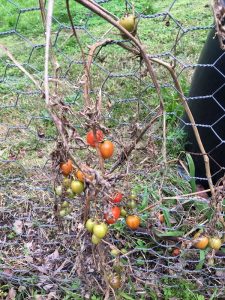 Carol’s feral tomatoes
Carol’s feral tomatoes
Those of you with good memories may remember when Carol Woolcock sent in some pictures about some feral tomatoes in her garden. Well, she has now written in to say that they are still ripening on the now very shrivelled vine, perhaps being warmed by the adjacent compost bin.
Another article from Angelo Eliades
Angelo’s latest article discusses Is rabbit manure good to use in the garden?. Hint: the answer is ‘yes’.
Incidentally, the private Facebook group Poop for Plants aims to connect those in Victoria with excess animal poop with gardeners seeking poop. Most of the offerings are from rabbits or guinea pigs. Read more of Angelo’s food-related articles.
More on gall wasp
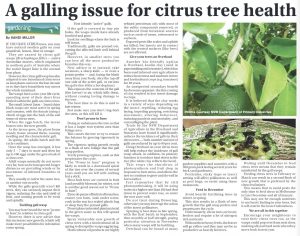 July’s Warrandyte Diary had an article by Sandi Miller on the subject.
July’s Warrandyte Diary had an article by Sandi Miller on the subject.
Stuart Rodda says that he has just bought a 12.5Kg bag of ‘Surround WP’, a calcined kaolin which is reported to deter gall wasp, for $98 at Hoogies Rural in Yarra Glen.
Want a job at Gardening Australia?
Horticultural Researcher based in Melbourne CBD. Working within the research team you will develop and deliver innovative gardening content for the 2020 season. 4 month contract. Around $80K pro rata. Read more and apply.
Some new Morag Gamble videos
Morag Gamble is a permaculture person who lives in Queensland and has a variety of websites and blogs. She has recently started producing a series of videos under the heading sense-making in a changing world and featuring people such as David Holgren and Mariam Issa. She is also a prolific publisher on Youtube. Thanks for the heads up, Fay Loveland!
Watch The Need To Grow
You can now watch The Need To Grow film online for free.
Guy’s fruit growing tip – valencia oranges
Winter is the season when many citrus trees bear fruit. But there is one type of citrus which fruits in summer, namely the valencia orange. So, for example, if you have both a navel orange and a valancia orange, then you will have oranges in both winter and summer.
Read more of Guy’s food-growing tips.
Meg’s social isolation week
I’m finally cutting back and tying in the raspberry canes and it makes me feel like I have actually achieved something this week. They look ready for summer fastened neatly on their wires, the last few ‘autumn’ raspberries finally finished.
As the days begin to get longer, and the shadows start to recede from the backyard, I can see that the veggies are finally beginning to put on some growth. The peas are now climbing the netting strongly and the broad beans seem to double in height each week. The leafy greens are growing strongly and the rocket is rocketing.
Yet, when the sun drops behind the hills and the chill sets in, old-fashioned comfort food is called for, preferably a recipe that helps use the glut of lemons this year. This lemon delicious is a lighter form of lemon pudding that is warm and comforting.
Lemon delicious
2 eggs, separated
1 cup of sugar
1 tablespoon butter
1 tablespoon self-raising flour
rind of 1 lemon, finely grated
juice from 2 lemons
1 cup milk
Cream the butter and sugar until it is light and fluffy.
Add the flour, milk, well-beaten egg yolks, lemon juice and rind. Mix well.
Beat the egg whites until still and fold gently into the pudding mix. Pour into an oven-proof dish and set in an oven tray filled with some water.
Bake at 160degC until set and golden.
Read more of Meg’s recipes on our website.
Reader photos
Last week’s theme – garden birds
16 photos were submitted. If you only want to look at a few of them, my suggestion would be the gang-gang cockatoos, the grey butcherbird and the tawny frogmouth because they are all unusual visitors. I have ordered the pictures by bird name.
Chris Kent: “The picture is of a male (red-headed) king parrot eating a green tomato. I have never seen a female (green-headed) king parrot eating a red tomato.”
Janet King: “The picture is of a male gang-gang cockatoo which was feeding on red berries in our garden. The female was feeding in the same tree but it wasn’t possible to get them both in the same photo. I believe that they always go around in pairs – for life apparently. I have never seen them before this year in Melbourne and they may have come in from more remote areas because of reduced availability of food.”
Jo Buckle: “When you know it’s time to net the apricots.”
Yennie Starkey: “This red wattlebird is feasting on our red hot poker [Kniphofia] plants. These vibrant plants provide a splash of colours during winter and food for these wattlebirds. They come most days.“
Here are a few random facts about some of these birds:
- Unlike many other birds, the female Australian magpies sing as well as the males. The Australian magpie is actually a type of butcherbird, not a type of magpie.
- Whilst male and female laughing kookaburras look similar, unusually they are ‘reverse size dimorphic’, which means that the adult females are typically larger than the adult males (by around 15%). They are also siblicidal, which means that the eggs in a clutch hatch at different times and, depending on the availability of food, the elder hatchlings might kill their younger siblings.
- Sulphur-crested cockatoos are consistently left-handed
The theme from 2 weeks ago – garden art
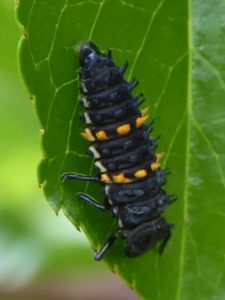
 Virginia Solomon, who is a Board Director of Permaculture Australia, has belatedly submitted the photo right. I wouldn’t normally allow this but I’ve made an exception here partly because Virginia wrote me a nice email apologising for her tardiness and partly because I like the photo. Here is how Virginia describes the art: “my three children made by the middle one (Mia) out of stove pipes and plough shares“.
Virginia Solomon, who is a Board Director of Permaculture Australia, has belatedly submitted the photo right. I wouldn’t normally allow this but I’ve made an exception here partly because Virginia wrote me a nice email apologising for her tardiness and partly because I like the photo. Here is how Virginia describes the art: “my three children made by the middle one (Mia) out of stove pipes and plough shares“.
This week’s theme – garden invertebrates
This week’s photo theme will be ‘garden invertebrates’, which includes insects, spiders, worms, etc. Send me your interesting photos, together with a title and (if you want) a story, and I will publish them next week.
To get you started, here is a photo of a ladybird larva from my garden, in case you didn’t know what they look like.
Which link was clicked most times in the last newsletter?
Pam Jenkins’ video about her annual edible garden.
Joke of the week
Submitted by Bulleen Art & Garden nursery: Lettuce isolate and beet coronavirus..
Upcoming online events
If you know of any events other than those listed below, email me.
Newly announced events
Understanding and improving your soil: Saturday, 1st August, 10.30-11.30am; $20; organised by Bulleen Art & Garden nursery. Read more and book on WeTeachMe.
What’s wrong with ultra-processed foods?: Tuesday, 18th August, 1.30-2.30pm; free; organised by University of Melbourne.
Waste, organic recycling and life cycle analysis: Wednesday, 26th August, 10am-4pm; $120; organised by CERES. Read more and book on Humantix.
Previously announced events
The hunger games – food safety at home: Friday, 24th July, 6-7pm; free; organised by Moreland City Libraries. Read more and book on EventBrite.
Pest control with companion planting: Saturday, 25th July, 10.30-11.30am; $20; organised by Bulleen Art & Garden nursery. Read more and book on WeTeachMe.
Growing fruit & veggies in small spaces: Saturday, 25th July, 1.30-2.30pm; $20; organised by Bulleen Art & Garden nursery. Read more and book on WeTeachMe.
Introduction to mushroom foraging and identification: Saturday, 25th July, 2-3.30pm; $25; organised by MYCOmmunity. Read more and book on their website.
Healthy productive compost & worms: Saturday, 25th July, 3.30-4.30pm; $20; organised by Bulleen Art & Garden nursery. Read more and book on WeTeachMe.
Butter chicken: Saturday, 25th July, 5-6pm; $29; organised by Cook Indian by the Creek. Read more and book via Facebook.
Backyard beekeeping basics: Tuesday, 28th July, 7-9pm; $50; organised by CERES. Read more and book on Humantix.
Chickpea curry: Friday, 31st July, 5-6pm; $29; organised by Cook Indian by the Creek. Read more and book via Facebook.
Chickpea curry: Saturday, 1st August, 5-6pm; $29; organised by Cook Indian by the Creek. Read more and book via Facebook.
Open Table offer their weekly no waste cook club workshops free and online on Saturdays. As well as cooking (which is actually optional), you will learn about food waste and composting. Register on EventBrite.
Pip Magazine (some of whose journalists live in North East Melbourne) are producing a series of videos entitled simple skills for self sufficiency.
All The Dirt is a weekly podcast about gardening.

